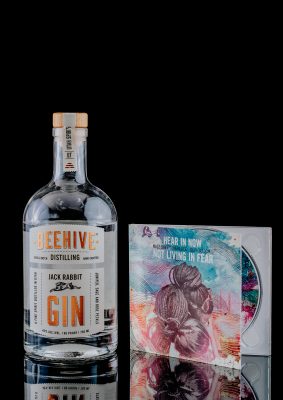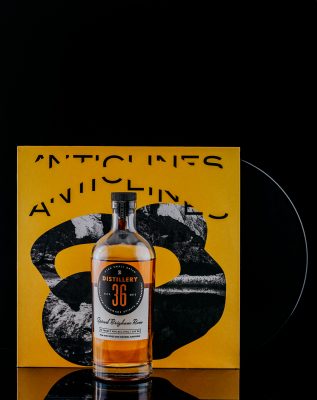
Spirit + Experimental Music Pairings
Beer & Spirits
For our April Local Beer issue, longtime SLUG beer writers Chris and Sylvia Hollands teamed up with Ogden’s The Meista for a fantastic list of metal albums to pair with sudsy libations from local breweries. For the sequel/spinoff, we’re looking at four locally distilled spirits and pairing them with excellent albums of experimental music. Whether your preference is for sweeter whiskeys or flavor-explosive gins, AACM-indebted improvised music or room-filling drone works, hopefully you’ll find some worthy combinations that celebrate the arts of spirit creation and boundary-pushing music making in equal measures.

Beehive Distilling – Jack Rabbit Gin
Hear in Now – Not Living in Fear (International Anthem, 2017)
The Jack Rabbit Gin’s botanical notes jump out at you from the first sniff. Distilled with juniper, sage and rose petals, this fruity and earthy blend masks any bitter bite from the alcoholic content contained within. Upon sipping, this savory sweetness is taken to further depths by a warm undertone that almost resembles freshly baked bread. And for its higher (90) proof, the Jack Rabbit is surprisingly palatable, mixing its diverse tasting notes into a single flavor that soothes like herbal tea.
This mix of approachability and vibrancy finds its analog through Hear in Now’s excellent 2017 record, Not Living in Fear. Like the delicate dance between the three star botanicals of Beehive’s Jack Rabbit, the trio of Mazz Swift (violin/voice), Tomeka Reid (cello) and Silvia Bolognesi (double bass) blend their woodsy string tones into a singing mass of interweaving lines, tumbling over and between each other in a brilliant dance. Many of the compositions feature a modal folksiness, as in the lilting strut of the Swift-penned “Leaving Livorno” or the grooving bassline of Bolognesi’s “Circle.”
But beneath these tunes are a web of compositional and improvisational oddities. In particular, standout solos from Bolognesi on “Requiem for Charlie Haden” and Reid on “Transiti” show a penchant for wild dissonance and improvisational fire. The title track, featuring vocals from Dee Alexander, bounces along an odd metric groove with the instrumental trio engaging in some head-spinning chromatic interplay, and “Prayer for Wadud” uses a low-end lament as a base for a positively explosive cadenza from Swift.
The Jack Rabbit Gin is a crisp, complex spirit in much the same way as Hear in Now: three technically astounding musicians cycling through a web of experimental forms and characters. But neither are reserved for connoisseurs of their respective mediums. Just like Beehive’s Jack Rabbit Gin has an honest sippability missing from more biting gins, Not Living in Fear excels in its blend of elegance
and experimentation.

Distillery 36 – Spiced Brigham Rum
Lucrecia Dalt – Anticlines (RVNG INTL., 2018)
Some might view the synthesized tones of Lucrecia Dalt’s Anticlines as cold and mechanical, but I’ve always heard a certain warmth in her spare soundscapes. While the blipping synthesizers that meander along through “Analogue Mountains” carry a mechanized dissonance, the track has a sinister strut that feels inviting rather than distancing. Further, the brief “Eclipsed Subject” drags a distorted sample of a solitary voice singing a modal melody, giving the impression of a perturbed future humanity attempting to recall the comfort of religious hymns and breaking down in real time as the memory fades.
Even more than this musical warmth, Dalt’s spoken word on Anticlines places the body and all its sweaty functions at the forefront. “I wanted to fill you up with my exhalations / And drink out all your flesh / But keep your bones and skin still flawless,” she intones on opening track “Edge,” immediately throwing listeners into a vat of hot skin and overworked organs. The steaming desires continue on the stuttering “Concentric Nothings”: “Let my system / Swallow its own / System / Let my breath / Move outward / In concentric / Nothings.”
Alongside this strange, feverish music, I’d reach for a darker, warmer spirit along the likes of the Brigham Spiced Rum. This spiced sibling of Distillery 36’s classic clear rum is a toasty, vibrant spirit, with wintery spices such as nutmeg and vanilla working their way through the mix. Underneath all of these complex flavors is a sustained brown sugar taste, a more reserved sweetness that keeps the Brigham Spiced Rum from teetering into saccharine territory.
Dalt’s Anticlines thus lives in a world beyond our own, where her surrealist spoken word and space-age electronics search for something beyond our reality. With its mystical sweetness and sublimely tangible subject matter, Anticlines serves as a monument to the breaking down of messy physicality. Distillery 36’s Spiced Brigham Rum might not have the same deconstructionist aims, but its dense spice mix works its way through your senses in a similarly all-consuming manner. Both are warm and sugary enough to count as a treat, though not so much that they lose their fiery, bewildering edge.

High West Distillery – Double Rye!
More Eaze – Mari (Orange Milk, 2020)
I’ll lay my bias out: High West’s Double Rye! is my favorite spirit distilled in Utah. It features all of whiskey’s warm flavors undercut with a rich and caramelly taste, expertly balancing notes of spiciness and sweetness and cutting away any bits of bitterness into a soft, fuzzy finish. Alongside the overt, cooked-sugar flavor, there’s an almost fruity lightness to the Double Rye! similar to a hearty cheese topped with bits of berries.
The comfort of the Double Rye! sits neatly alongside Mari Maurice’s latest as More Eaze, the bubbly and bombastic Mari. From the tight, lilting melody of “talk” on, the music on Mari exudes a childlike euphoria of re-remembrance. Throughout the record, intimate, pitch-shifted vocals weave in and out of synth-led pop music’s scattered shells, giving the music feelings at once nostalgic and futuristic.
On “progress in therapy (ft. claire rousay),” exuberant synthesizer melodies jut into galloping drums while whispered voices creep under the mix with startling closeness, and the sparkling “witness” reaches for a lullaby-like progression. Mari’s vocals stretch across the mix in a plaintive yearn as the track opens up into a distorted anthem, all before fading away through a distant, piano-string elegy. Much of Mari excels in this kind of breakneck emotional flitting, feeling simultaneously sorrowful and ecstatic, hopeful and lamenting.
Some tracks cut down on this directional approach and layer these potentially contradicting emotions on top of each other, as on the touching “gender dysphoria trauma bonding (ft. amulets).” The track mostly floats along a midtempo loop, but blends Mari’s vocals into a stately percussion thrum and a balladic synth riff, funneling all of Mari’s contrasts into a single second.
Both High West’s Double Rye! and More Eaze’s Mari exude a joyousness that feels unreal and otherworldly. On Seth Graham’s cover for Mari, opalescent 3D shapes float alongside a puffy cloud in a starkly clear digital sky; On Double Rye’s label, a silhouetted cowboy figure stares out over a blur of warm oranges and yellows. Neither image calls upon our own time and place, but in this pairing, we can temporarily live in these
pastoral fantasies.

Ogden’s Own Distillery – Five Wives Vodka
Éliane Radigue – Œuvres électroniques (INA-GRM, 2018)
When it comes to Utah-distilled vodka, you can never go wrong with the classic Five Wives blend from Ogden’s Own Distillery. The distilling water is sourced from a remote spring, resulting in a spirit that emphasizes vodka’s smooth and clean characteristics. A whiff of Five Wives eschews any acetone-ridden smell, and sipping this spirit offers a nearly refreshing experience. Like high-end mineral water, Fives Wives sits clean on your palette, with just the tiniest bite and a sweetness that lingers on your tongue seconds after swallowing.
A worthy pairing for this stoically simple spirit is the GRM’s essential box set collecting the French composer Éliane Radigue’s electronic works from 1971 to 2000. Across Œuvres électroniques’ 14 discs, Radigue’s synthesizer-based drone pieces immerse listeners in baths of sound that teethe with tenacity. Especially on some of her landmark works (2002’s Adnos I–III and 1998’s Trilogie de la Mort), her compositions often consist of little more than a few oscillating synthesizer tones. Radigue’s music floats along at low volumes and with languorous harmonic rhythms, moving with such a glacial pace that each minute gesture feels like the strike of a bell tower.
In addition to these three-hour excursions, Œuvres électroniques offers a number of earlier experiments, including the full version of 1983’s narrative-driven Les Chants De Milarepa, featuring the voices of Lama Kunga Rinpoche and Robert Ashley atop Radigue’s austere synthesizers. The boxed set closes with “L’île re-sonate,” a 3-part wash of sound that distills Radigue’s greatness into a neat hour.
There’s a radical emptiness to both Radigue’s music and Five Wives Vodka. Surface level encounters with either side of this pairing might resemble staring at a blank canvas, but deeper engagement with both (and especially when imbibed together) is like peering in so close that you notice the nuances of each thread.; an expression so faint and unobtrusive that it becomes something uniquely pure. And with 14 hours of music to work through, Œuvres électroniques is a perfect partner for downing a whole bottle of Fives Wives (though hopefully not in one sitting).